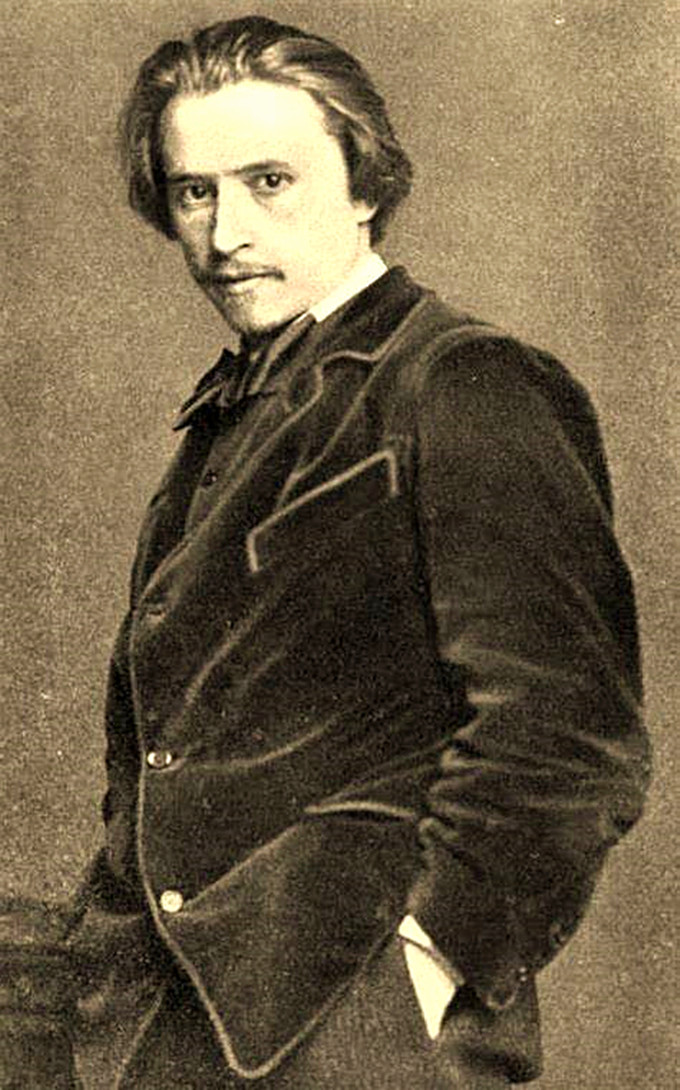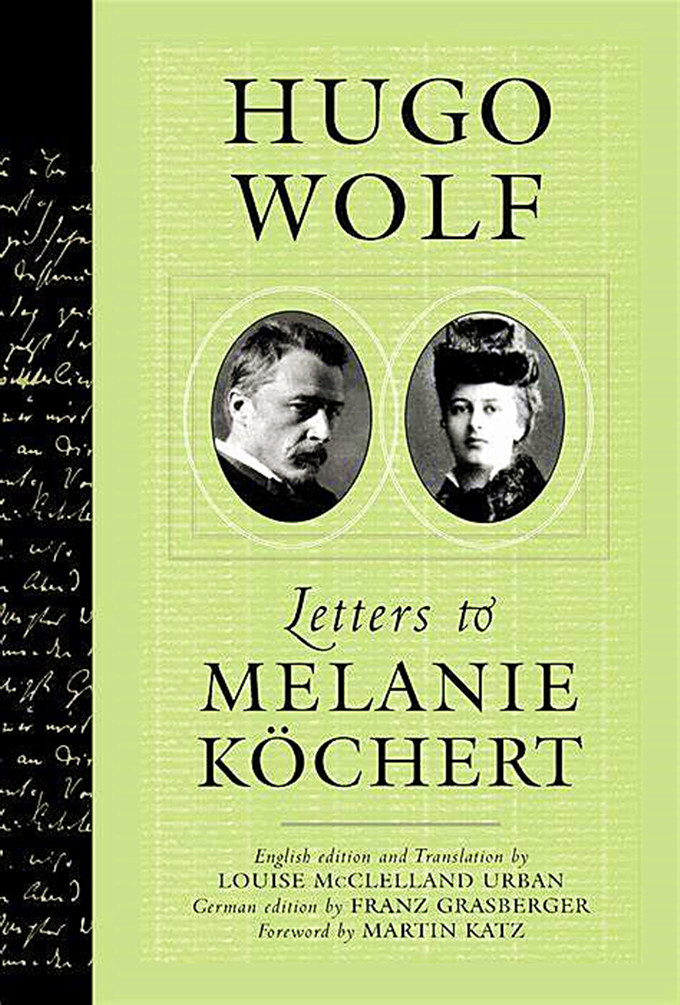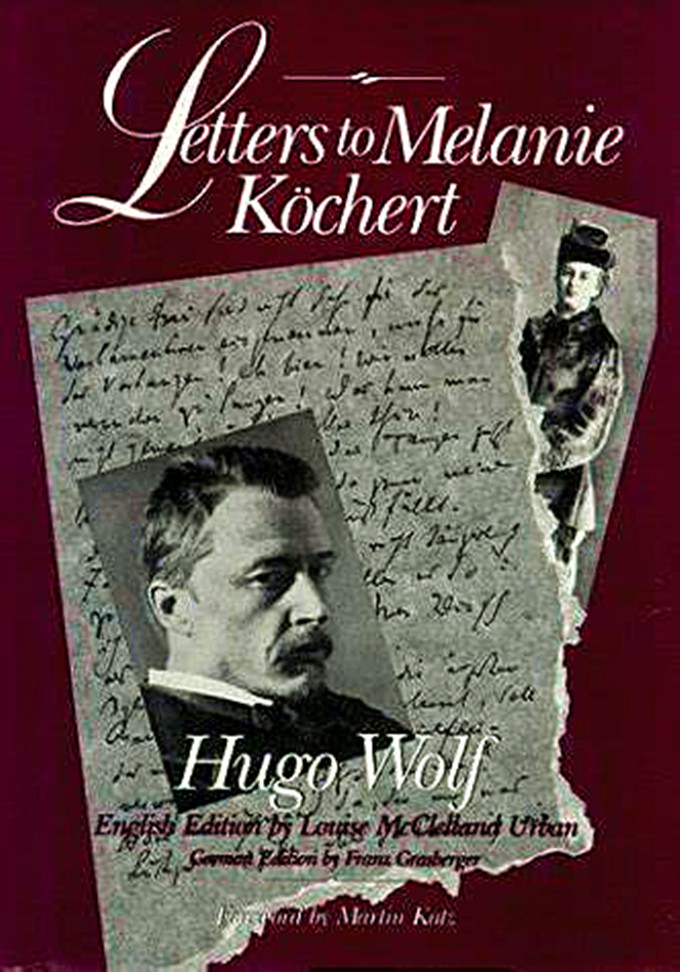|
||||||||||||||||||||||||||
 |
 |
|||||||||||||||||||||||||
|
|


|
|||||||||||||||||||||
 |
|
||||||||||||||||||||
| 沃尔夫·胡戈 ( Wolf Hugo 1860-1903) | |||||||||||||||||||||
| 鲍罗丁四重奏团演奏舒伯特·德彪西·沃尔夫·格什温·肖斯塔科维奇(1987) | |||||||||||||||||||||
Borodin Quartet play Barber Schubert Debussy Wolf Gershwin Shostakovich(1987) |
|||||||||||||||||||||
|
鲍罗丁四重奏演奏舒伯特·德彪西·沃尔夫·格什温·肖斯塔科维奇(1987) Borodin Quartet play Schubert Debussy Wolf Gershwin Shostakovich(1987) 简介补充:00:00 -塞缪尔·巴伯慢板从弦乐四重奏,作品11号 舒伯特- Quartettsatz, D. 703 17:28 -德彪西-谐谑曲,弦乐四重奏,作品10 22:40 -沃尔夫·胡戈-意大利小夜曲 30:30 -格什温-摇篮曲 肖斯塔科维奇:两首弦乐四重奏,挽歌和波尔卡 |
|||||||||||||||||||||
|
简介补充: 00:00 - Samuel Barber -
Adagio from String Quartet, op. 11 08:13 - Schubert - Quartettsatz, D. 703 17:28 - Debussy - Scherzo from String Quartet, op. 10 22:40 - Hugo Wolf - Italian Serenade 30:30 - Gershwin - Lullaby 40:25 - Shostakovich - Two pieces for string quartet, Elegy and Polka |
|||||||||||||||||||||
|
|
|||||||||||||||||||||
|
音乐历史上的今天
1888年7月19日,28岁的沃尔夫·胡戈(Wolf
Hugo)第一次在《新自由报》上的个人专栏里安插暗号,以此和他的秘密恋人、也是他赞助人的妻子美兰妮·考切特(Melanie
Kochert)联系。 |
|
||||||||||||||||||||
 |
|||||||||||||||||||||
| 沃尔夫·胡戈(Wolf Hugo) | |||||||||||||||||||||
|
路德维希
雨果·沃尔夫(1860-1903)是浪漫主义晚期的奥地利作曲家,主要以他的艺术歌曲而被人们所记住。他的生活充满了麻烦,在创作的过程中,他会连续2到3天不眠不休地创作一首歌曲,直到完成为止。 这些日子大多发生在1888年和1889年,那时他快30岁了。在他短暂的一生中,他的创造力经常被长期的抑郁症所打断。1898年,在遭受精神崩溃之前,他写下了自己的最后一首歌。他逐渐失去理智,精神错乱,于1903年去世,享年43岁。 在作曲风格上,他是理查德·瓦格纳的狂热追随者,这使他与勃拉姆斯的追随者们处于敌对状态——瓦格纳和勃拉姆斯是年轻作曲家和上流社会的两个音乐“阵营。沃尔夫的音乐在音乐媒体上受到了勃拉姆斯听众的无情诋毁,同时也受到了瓦格纳的欢呼。沃尔夫的音乐充满了色彩和激情——对他来说,什么都不够。 |
|||||||||||||||||||||
 |
|||||||||||||||||||||
| 沃尔夫·胡戈(Wolf Hugo)与美兰妮·考切特(Melanie Kochert) | |||||||||||||||||||||
|
梅勒妮·柯切特,维也纳宫廷珠宝商的妻子,一直是沃尔夫成年后的情人 Melanie Kochert , wife of the jeweller to the Vienna court, remained Wolf’s lover throughout his adult life |
|||||||||||||||||||||
|
胡戈·菲利普·雅各布·沃尔夫,(1860年3月13日生于奥地利温迪施格拉茨[现斯洛文尼亚斯洛文尼亚],1903年2月22日在维也纳逝世),作曲家,将19世纪的德国艺术歌曲《谎言》推向了顶峰。 沃尔夫曾就读于维也纳音乐学院(1875-77),但他生性喜怒无常,性情暴躁,因直言批评其导师而被音乐学院开除。1875年,他遇到了作曲家理查德·瓦格纳,并得到了他的鼓励。1879年,他遇到了约翰内斯·勃拉姆斯,并从他那里得到了鼓励和鼓励,拓宽了他的音乐领域和事业。他也是马勒年轻时的朋友。在19世纪70年代晚期,沃尔夫显然感染了梅毒,这将使他致残并丧命。在疾病的反复复发中,沃尔夫会陷入深深的抑郁,无法作曲,但在解脱期间,他光芒四射,深受鼓舞。1883年,沃尔夫成为《维也纳沙龙》的音乐评论家;他的每周评论为他那个时代的维也纳音乐世界提供了相当深刻的见解。 他早期的歌曲包括歌德、莱诺、海因里希·海涅和约瑟夫·冯·艾申多夫的诗歌背景。1883年,他根据海因里希·冯·克莱斯特的悲剧创作了交响诗《Penthesilea》。从1888年起,他根据歌德、爱德华·弗里德里希·莫里克等人的诗歌创作了大量的歌曲。1891年出现了关于P.J.L.冯·海斯和伊曼纽尔·冯·盖贝尔诗歌的《西班牙歌集》(西班牙歌集),之后是《西班牙歌集》(1892年;第2部分,1896)。其他的歌曲循环是亨里克易卜生和米开朗基罗的诗歌。他的第一部歌剧《柯雷吉多尔》(1895年;它是根据佩德罗·安东尼奥·德·阿拉孔的一个故事创作的,1896年在曼海姆创作时失败了;修订版于1898年在斯特拉斯堡出版。他的第二部歌剧《曼努埃尔·贝内加斯》,也是在阿拉尔孔之后,仍未完成。 沃尔夫作为一名作曲家的名声在他的一生中促成了柏林和维也纳的狼社的形成。然而,他工作所得的微薄收入迫使他不得不依赖朋友们的慷慨解囊。1897年,他被关进精神病院,表面上是在接受马勒的指责,实际上是由于越来越多的精神错乱和麻痹的迹象。1898年,他被暂时释放,但不久之后,他试图自杀,但没有成功。1898年10月,他请求被安置在维也纳的一家精神病院。 |
|||||||||||||||||||||
 |
|||||||||||||||||||||
| 沃尔夫·胡戈(Wolf Hugo)致心爱的(Eduard Mörike),签名,1889年,维也纳图书馆 | |||||||||||||||||||||
| 沃尔夫·胡戈(Wolf Hugo)-诞辰150周年展览开幕。来自维也纳图书馆和维也纳博物馆的藏书 | |||||||||||||||||||||
| 维也纳,2010年3月2日。2010年3月,在雨果·沃尔夫(Hugo Wolf)诞辰150周年之际,维也纳图书馆将分两部分为作曲家举办一场展览,他在音乐史上,尤其是他的歌曲中,获得了永久的地位。在市政厅的展示柜中,调查了雨果·沃尔夫的性格痕迹;早期的个人文件和全家福,他在维也纳的第一步是在着名的和具有重要社会意义的家庭担任钢琴老师,与Gustav Mahler一起参观素食餐厅,或者与Hermann Bahr或Edmund Lang成为合租公寓的居民。显示了他在维纳沙龙画廊的一些评论,其中他猛烈批评了约翰内斯·勃拉姆斯,并为他的理查德·瓦格纳致敬。 | |||||||||||||||||||||
|
Wolf Hugo - 150th
anniversary exhibition opens.Collections from the Vienna Library and the
Vienna Museum Vienna, March 2, 2010.In March 2010, on the 150th anniversary of the birth of Hugo Wolf, the Vienna Library will open a two-part exhibition of composers who have secured a permanent place in music history, especially in his songs.In the display case at City Hall, traces of Hugo Wolf's character are investigated;Early personal papers and family photographs, his first steps in Vienna were to teach piano in famous and socially important homes, visit vegetarian restaurants with Gustav Mahler, or become residents of Shared apartments with Hermann Bahr or Edmund Lang.It shows some of his comments at the Winer Salon gallery, in which he fiercely criticized Johannes Brahms and paid tribute to his Richard Wagner. |
|||||||||||||||||||||
|
|
|||||||||||||||||||||
|
Today in the
history of music On July 19, 1888, Wolf Hugo, 28, first placed a code word in his personal column in the New Freedom to contact his secret love interest, his patron's wife, Melanie Kochert. In the late 19th century The Austrian composer Wolf Hugger was born into a great musical tradition.But as far as character is concerned, he remains an outsider.Songs -- German art songs -- were his weapon of choice against the Authorities in Vienna.Wolff brings the Schubert and Schumann tradition to a degree of intensity and textual hypersensitivity that few can fully appreciate.Wolf has done little to please his audience.An unpretentious composer from the provinces (Wandis Graz, Styria, now Slovenia), he was irascible and impulsive, but sensitive to mistakes and prone to mood swings bordering on manic depression.When he came to Vienna to study, he did not hide his ambition.His audience, he declared, was gourmets, not amateurs.Seven years later, with the publication of a volume of songs by the German romantic poet Eschendorf, Wolf was still penniless.A failed attempt at a command post at Salzburg was the closest he came to mastering what his father thought was a real job.Philipp Wolf fumed that his son was "out of tune than our piano." Wolf's musical sound -- he calls it "the Wolverine's own howl" -- took a decade to become the center of attention.The following weeks were marked by depression and drought.With one after another of Mollick's songs trickling out of Wolff's pen in 1888, it was a breakthrough year comparable to Schubert's 1814-15 and Schumann's 1840.On the material level, Wolf's short lyrical songs gradually earned his reputation by combining musical instruction and accompaniment with a knack for attracting patrons and patrons of Vienna's educated elite (not to mention the lifelong mistress of one of their wives)."I am writing now, dear friend," he wrote to his brother-in-law, "for posterity.Their masterpiece." With a short stature and standing more than five feet (154 centimeters) tall on a small roll of songs, Wolf, 30, has become an icon for the next generation of music students."Hugo Wolf belongs to us and we belong to him," the critic and composer Max Graf wrote in his memoir."We stared at the pale man, who was standing in the bleachers of the theatre, just like us, while Brahms sat in a box, like God on a cloud." 1. The Borodin Quartet performs Schubert Debussy Wolf Gershwin Shostakovich (1987);Hugo Wolf Quartet - Haydn String Quartet in E Flat Major, Op. 33. |
|
||||||||||||||||||||
 |
|||||||||||||||||||||
| 沃尔夫·胡戈(Wolf Hugo)与美兰妮·考切特(Melanie Kochert)通信集 | |||||||||||||||||||||
|
沃尔夫·胡戈(Wolf Hugo):给美兰妮·考切特(Melanie Kochert)的信 沃尔夫·胡戈 弗朗茨·格拉斯伯格和露易丝·麦克勒兰德城市的贡献 威斯康辛大学出版社,2003 文章:978-0-299-19444-4 这是一个爱情故事。它讲述了德国最伟大的艺术歌曲大师之一胡戈·沃尔夫(Hugo Wolf)与梅兰妮Köchert之间的一段非凡的书信关系,沃尔夫对音乐诗意精神的投入仅次于弗朗茨·舒伯特(Franz Schubert)和罗伯特·舒曼(Robert Schumann)。梅兰妮是维也纳一位著名珠宝商的妻子,沃尔夫与她有着一生的情感、精神和艺术纽带。 沃尔夫写给考切特的信——他在1887年1899年间写了245封信——是在弗洛伊德、马勒和克里姆特时代维也纳的阴影下,欧洲经历了一场史无前例的文化剧变。它们展示了沃尔夫最乐观的一面,庆祝他的音乐会成功,以及他认为对他的创作能力来说是如此珍贵的孤独。他们跟随沃尔夫度过了极度绝望的时光,他在音乐上的失败让他深深地疏离,正如他向柯切特透露的那样,他被一种“无法形容的空虚和凄凉感”所征服。他们跟随沃尔夫努力创作250首令人惊叹的艺术歌曲,这是他的创作遗产,他几乎同时陷入疯狂。 《胡戈·沃尔夫:致梅勒妮·科切特的信》(Letters to Melanie Kochert)由沃尔夫学者和翻译路易丝·麦克勒兰德·厄本(Louise McClelland Urban)精心翻译,是一部文学和音乐作品,甚至是最高层次的作品。 关于这本书 |
|||||||||||||||||||||
 |
|||||||||||||||||||||
| 沃尔夫·胡戈(Wolf Hugo)与美兰妮·考切特(Melanie Kochert)通信集 | |||||||||||||||||||||
|
Hugo Wolf:
Letters To Melanie Kochert by Hugo Wolf contributions by Franz Grasberger and Louise McClelland Urban University of Wisconsin Press, 2003 Paper: 978-0-299-19444-4 This is a love story. It tells of an extraordinary epistolary relationship between Hugo Wolf, one of the greatest masters of the German art song, whose dedication to the poetic spirit of his music was equaled only by Franz Schubert and Robert Schumann, and Melanie Köchert, the wife of a prominent Viennese jeweler with whom Wolf shared a lifelong emotional, spiritual, and artistic bond. Wolf’s letters to Köchert—he wrote 245 between 1887 and 1899—were composed during a period of almost unprecedented cultural upheaval in Europe, in the shadow of Vienna during the era of Freud, Mahler, and Klimt. They reveal Wolf at his most optimistic, celebrating his concert successes and the solitude he believed was so precious to his ability to compose. They follow Wolf through times of overwhelming despair, when his musical failures left him profoundly alienated, overcome, as he revealed to Köchert, "by a feeling of unspeakable emptiness and desolation." And they follow Wolf as he struggled to compose the 250 astounding art songs that are his creative legacy, and his almost simultaneous descent into madness. Hugo Wolf: Letters to Melanie Köchert, sensitively translated by Wolf scholar and interpreter Louise McClelland Urban, is a literary and musical even of the highest order |
|||||||||||||||||||||
|
|
|||||||||||||||||||||
胡戈·沃尔夫四重奏-海顿降e大调弦乐四重奏,作品33,第2号,“笑话” |
|||||||||||||||||||||
| Hugo Wolf Quartet - Haydn's String Quartet in E-flat Major, Op.33, No. 2, 'Joke' | |||||||||||||||||||||
|
|
|||||||||||||||||||||
| 未得原作者编者授权严禁转载www.mt77.com任何内容 | |||||||||||||||||||||
|
|
|
||||||
|
copyright © 2003-2005 xilu.com all rights reserved. |
||||||
|
|
||||||











